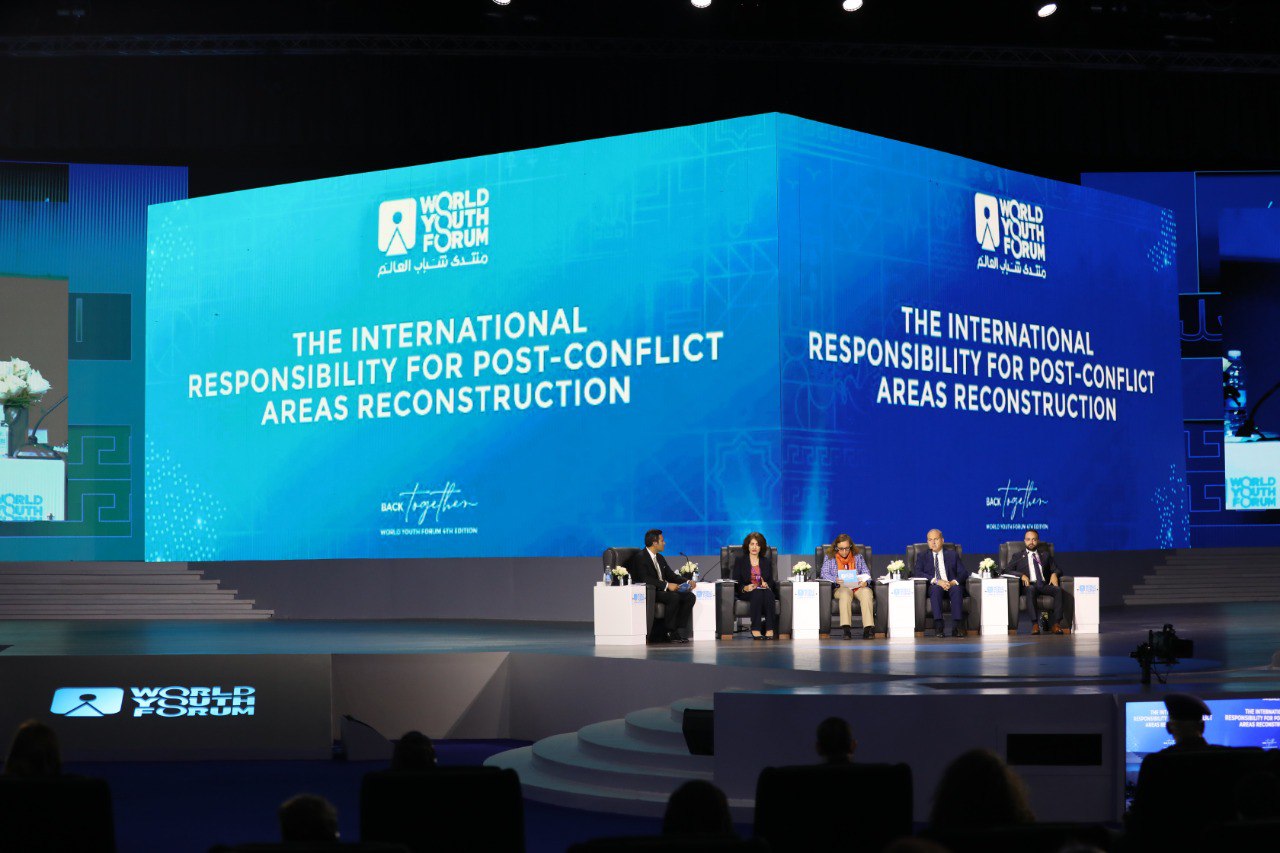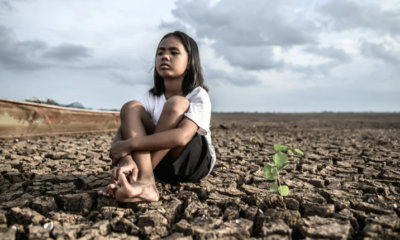The Forum
The International Responsibility for Post-Conflict Areas Reconstruction

This Forum’s edition has addressed post-conflict reconstruction amid ongoing wars and conflicts, and the ever-increasing waves of migrations, coupled with the devastating impacts of COVID-19 on the most vulnerable people in the areas of conflicts.
The session entitled “The International Responsibility for Post-Conflict Areas Reconstruction” was held in the Capital hall, with the participation of President Abdel Fattah El-Sisi and many figures.
The session started off with a film highlighting grave losses triggered by armed conflicts. It also shed light on Egypt’s active role in the African and Arab arenas and its developmental diplomacy in areas affected with conflicts, for instance, Gaza. The film also recalled the statement of the President Abdel Fattah El-Sisi in a previous session on post-conflict reconstruction that was held in the second edition of the WYF.
Tareq Al-Naamabi, Ambassador of Yemen Youth Arab African Council for Integration and Development, pointed out the destructive humanitarian crisis in his country where over 4 million are internally displaced and half of the Yemeni population live in abject poverty. He also referred to the absence of transparency in aid delivery. He also asked Egypt to play a greater role by promoting communication and he recommended the launching of training programs like Egypt’s Presidential Leadership Program (PLP) through the National Training Academy (NTA) for the Yemini youth in areas of conflicts in order to be the impetus for post-conflict reconstruction.
Then, Ms Sahar Al-Jobury, Head of UNRWA representative office in Cairo, thanked President Abdel Fattah El-Sisi for his endeavor and his speech during the UN General Assembly session in which he called on the international community to provide funds to the UNRWA. She recalled the sufferings of people in Palestine and Jordan, especially the refugees, in the post-pandemic age, indicating that their needs have become bigger and they have become more dependent on the UNRWA that already lacks funds. She stated that there is a need to ensure the sustainability of funding. In this regard, she expressed her aspiration to direct the attention of the international community towards the need to sustain funds for the UNRWA, with the support of Egypt. She also recalled Egypt’s efforts and support to the UNRWA.
Following her speech, Susanne Mikhail, Regional Director of the UN Entity for Gender Equality and Empowerment of Women (UN Women) for the Arab States, participated via video conference. She demonstrated how conflicts affect women and she alluded that gender-based violence is a form of warfare. She added that it is difficult to protect civilians, notably women and children, during conflicts. She further implied that wars became more extended or what we call a protracted crisis. She stressed on the need to provide humanitarian aid and to allocate funds for capacity building.
Graziella Rizza, Human rights Advisor to the European Union Delegation to Egypt, said that the environment of peace and stability is very challenging, and that instability has devastating impacts in Yemen and Gaza. She alluded that we need to have an integrated approach to promote peace and to adopt common values, as well as supporting the UN 2030 Agenda, Paris Agreement, and Addis Ababa Agenda. Besides praising Egypt’s efforts, she said that we need to adopt a developmental approach not a humanitarian one, and that we need to reconsider the political dimension. She also pointed to preventive diplomacy as a key tool for conflict prevention. She stressed on youth participation and human rights as well.
Leslie Reed, USAID Mission Director for Egypt, stated that conflicts are a direct result of conflicts. She added that we need to understand the conflict dynamics in order to deliver an effective response. She further noted that the USAID works with local operatives/partners to deliver aid to the most vulnerable people. She stressed that inclusive development is crucial.
Ambassador Ahmed Abdel Latif, the General Director of CCCPA, pointed out that post-conflict reconstruction was not a priority for the international community, implying that there has been a focus on conflict prevention and reaching truces. However, he added that the international community focuses on it nowadays. He stressed that Egypt has played a leading role in promoting post-conflict reconstruction by referring to its efforts in Gaza and the establishment of the African Union Post-Conflict Reconstruction and Development last month. He added that post-conflict reconstruction and building calibers are a national priority for Egypt. He further emphasized on prioritizing post-conflict reconstruction at both regional and global levels, and on the necessity of capacity building in order to train calibers on post-conflict reconstruction.
The Vice President of the UN Peacebuilding Support Office participated virtually via video conference. She asked to integrate mental health in peace and security. She also stressed on youth participation in post-conflict reconstruction since they are the leaders of today and tomorrow.
President Abdel Fattah El-Sisi called for ending conflicts in order to ensure the participation of all in post-conflict reconstruction. His Excellency alluded to the difference between mitigating the impacts of conflicts and post-conflict reconstruction which is about not only the provision of funds but also the humanitarian, social, and psychological dimensions. He finally noted that Egypt is open for all.












